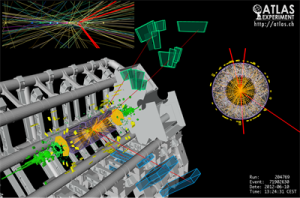May 15 2014
The RHUL Centre for Particle Physics has recently been awarded funds to upgrade its High-Performance Computer (HPC) cluster, used primarily to process data produced in very high energy proton-proton collisions at the Large Hadron Collider (LHC) at CERN*.
The funds were awarded by the UK STFC Research Council and were supplemented with funds from RHUL: a total of £250k will be invested in the upgrade of the RHUL HPC cluster.
 Computer display of a collision recorded with the ATLAS detector at the LHC, consistent with the production of a Higgs particle decaying to four muons (indicated in red)
Computer display of a collision recorded with the ATLAS detector at the LHC, consistent with the production of a Higgs particle decaying to four muons (indicated in red)
The so-called "Grid" is an extensive world-wide network of HPC clusters, developed in the last decade, to provide the very large data storage and number-crunching power required to store and process the huge amounts of data collected by the experiments at the LHC. The UK Grid project for particle physics, called GridPP, contributes 17 interconnected HPC clusters sited at different universities and at the Rutherford Appleton Laboratory. The RHUL cluster is part of the regional "LondonGrid", together with Brunel, Imperial College, QMUL and UCL. After the upgrade, now under way, the RHUL cluster will have approximately 1400 TB of data storage (twice the current storage) and its number-crunching power will have increased by 50%.
The RHUL Centre for Particle Physics includes a research group active in the ATLAS experiment at the LHC: the group's research covers (i) the study of the recently found Higgs particle, (ii) the study of the properties of the heaviest elementary particle ever found - the top quark, and (iii) searches for new exotic particles, such as gravitons.
The GridPP team at RHUL includes one full-time Grid Computing Officer, Govind Songara, who is tasked with the operation of the RHUL cluster, and also Barry Green, Simon George, Pedro Teixeira-Dias. Duncan Rand, from Imperial College, coordinates the operation of all the Grid clusters that are part of the LondonGrid, including the cluster at RHUL.
* CERN is the European Laboratory for Particle Physics, in Geneva, Switzerland.